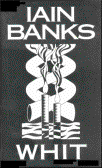
Publisher: Orbit (1995)
ISBN: 0 316 91436 3
Précis: Isis Whit is no ordinary teenager. An innocent in the ways of the world, an ingénue when it comes to pop and fashion, she does however rejoice in the exalted state of Elect of God of the Luskentyrian Sect, a small but committed religious cult based near Stirling.
A month before their four-yearly Festival of Love, during which members indulge vigorously in acts of carnal abandon, the Luskentyrians are thrown into crisis when their Guest of Honour renounces her faith and refuses to attend. Isis' standing in the Community, coupled with the fact that the apostate is her cousin Morag, swiftly marks her out as the person to venture out among the Unsaved and bring the fallen one back into the fold.
But her mission through the spiritual barrenness of Nineties Britain - with its 'herbal' cigarettes, compact discs and neo-fascist thugs - is soon made even more treacherous. It appears that not only has Morag embraced the ways of the Unsaved with spectacular abandon, but for some reason she seems to be actively avoiding Isis, whose own hallowed status among the brethren undergoes a radical about-turn as her pillar of faith slowly crumbles from within.
Summary: Isis' is one of the Elect, born on a holy day of great significance to the Luskentyrian Sect, and as such she accords respect among the members of the Sect. When news of her cousin's refusal to attend the festival reaches the Sect members she is chosen to go out among the Unsaved and rescue her cousin from herself.
The Sect is somewhat luddite in views and believes the use of technology is something of a sin. Thus Isis' journey to London is of a somewhat long winded and eccentric manner. Involving the use of a rubber inner tube, hitching passage on a train and walking a lot. Eventually she arrives in London and rendezvous with a member of the Sect living there.
After a few false starts in tracking down Morag, the erstwhile cousin, it is discovered that Morag has developed a promising career as pornography star. Even more puzzling is that evidence suggests that Morag is actively avoiding Isis. After a few near misses with Morag Isis is recalled to the Sect where she is accused of stealing holy ointment and of disobeying her faith among the Unsaved. Unable to defend herself adequitely from the charges she is forced to leave the Sect in disgrace, protesting as she goes of her innocence and of her intentions to clear her name.
After returning from the Sect she finally makes contact with Morag, who upon hearing of the charges being levelled against Isis reveals information about the Sects past to Isis. Together they begin investigating the background of the Sects founder, Isis' grandfather. After searching records and talking to the other founding members of the Sect, all of whom were either reported as dead or disgraced, Isis begins to put together the real history of the Sect. She also manages to uncover exactly who has been implicating her and why.
Returning to the Sect she, with Morag's help, both clears her name but manages to also impose changes to the Sect's codes to make it return to being a more friendly group. By judicious use, otherwise known as blackmail, of her grandfather she furthermore becomes the unofficial leader of the sect.
Comments: This book strikes a tone somewhere between 'Canal Dreams' and 'Espedair Street'. It doesn't have any of the violence that 'Canal Dreams' did, but in terms of the quality of the narrative it is of similar level. (Which is not to say the book is bad, but more that it is of average quality for Iain.) Like 'Espedair Street' it has a generally cheerful tone. And in common with both novels it has moments of extreme hilarity.
However it somehow comes across as being slightly flat in tone. It's lacks the over-arching weirdness of 'Espedair Street' or the background murder mystery thread that binds 'Crow Road' together. It simply is a story about Isis and her adventures, and subsequent loss of faith, when she journeys into the real world away from her Sect. It has the singular distinction of being the only Iain M. book that I got to the end of and said 'So that is it?'.
I kept expecting the deeper layers that are present in his other books to kick in. Other than this lack of extra depth it is a well told story and has his usual complexity of characters going on through the story. (Although Isis herself takes time to become complex given that her initial starting state is of an innocent in a world of carnivores...) About the only problem is that anyone vaguely familiar with the more scandelous Sects reported in the news media will not be surprised in the slightest by the revelations the book makes about Isis' home Sect.
Perhaps Iain felt it was time to make a story showing the depths of idiocy that religion can descend to. But if that was the case, then the book fails to impress as a parable against religion because it lacks the affirming message that 'Crow Road' had. If I had to pick one of Iain's book as a representative of atheism in fiction then my choice would have to go to 'Crow Road' rather than 'Whit'.